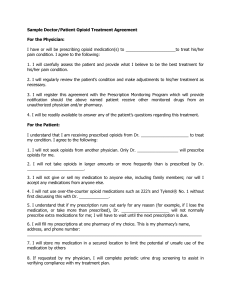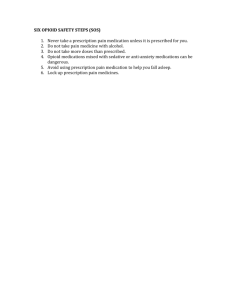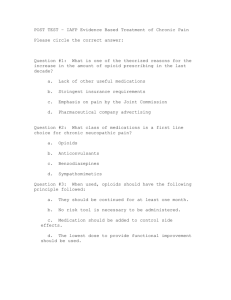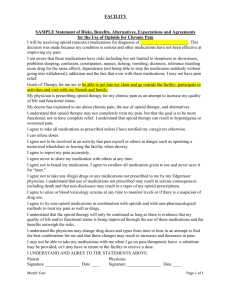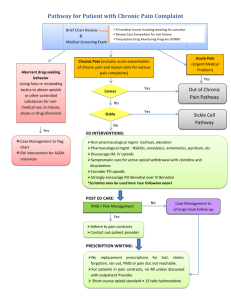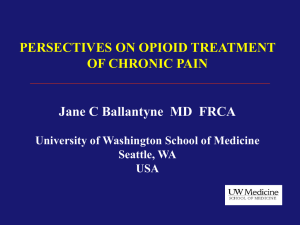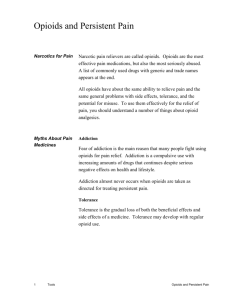Informed Consent for the Use of Opioid Medication
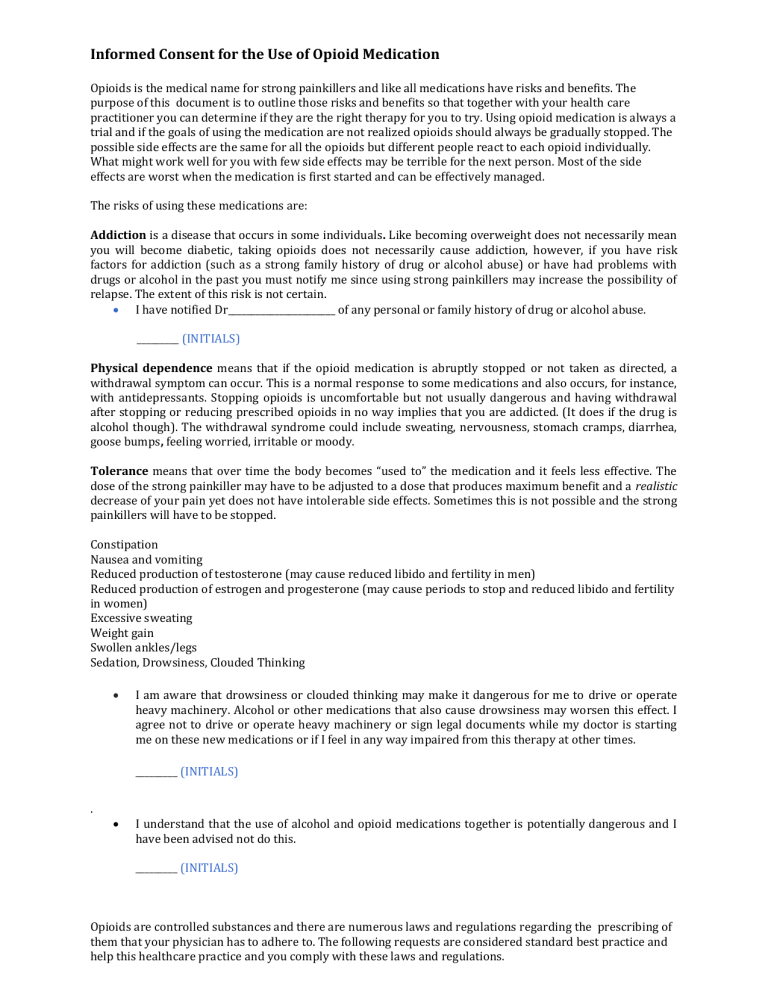
Informed Consent for the Use of Opioid Medication
Opioids is the medical name for strong painkillers and like all medications have risks and benefits. The purpose of this document is to outline those risks and benefits so that together with your health care practitioner you can determine if they are the right therapy for you to try. Using opioid medication is always a trial and if the goals of using the medication are not realized opioids should always be gradually stopped. The possible side effects are the same for all the opioids but different people react to each opioid individually.
What might work well for you with few side effects may be terrible for the next person. Most of the side effects are worst when the medication is first started and can be effectively managed.
The risks of using these medications are:
Addiction is a disease that occurs in some individuals. Like becoming overweight does not necessarily mean you will become diabetic, taking opioids does not necessarily cause addiction, however, if you have risk factors for addiction (such as a strong family history of drug or alcohol abuse) or have had problems with drugs or alcohol in the past you must notify me since using strong painkillers may increase the possibility of relapse. The extent of this risk is not certain.
I have notified Dr_______________________ of any personal or family history of drug or alcohol abuse.
_________ (INITIALS)
Physical dependence means that if the opioid medication is abruptly stopped or not taken as directed, a withdrawal symptom can occur. This is a normal response to some medications and also occurs, for instance, with antidepressants. Stopping opioids is uncomfortable but not usually dangerous and having withdrawal after stopping or reducing prescribed opioids in no way implies that you are addicted. (It does if the drug is alcohol though). The withdrawal syndrome could include sweating, nervousness, stomach cramps, diarrhea, goose bumps, feeling worried, irritable or moody.
Tolerance means that over time the body becomes “used to” the medication and it feels less effective. The dose of the strong painkiller may have to be adjusted to a dose that produces maximum benefit and a realistic decrease of your pain yet does not have intolerable side effects. Sometimes this is not possible and the strong painkillers will have to be stopped.
Constipation
Nausea and vomiting
Reduced production of testosterone (may cause reduced libido and fertility in men)
Reduced production of estrogen and progesterone (may cause periods to stop and reduced libido and fertility in women)
Excessive sweating
Weight gain
Swollen ankles/legs
Sedation, Drowsiness, Clouded Thinking
I am aware that drowsiness or clouded thinking may make it dangerous for me to drive or operate heavy machinery. Alcohol or other medications that also cause drowsiness may worsen this effect. I agree not to drive or operate heavy machinery or sign legal documents while my doctor is starting me on these new medications or if I feel in any way impaired from this therapy at other times.
_________ (INITIALS)
.
I understand that the use of alcohol and opioid medications together is potentially dangerous and I have been advised not do this.
_________ (INITIALS)
Opioids are controlled substances and there are numerous laws and regulations regarding the prescribing of them that your physician has to adhere to. The following requests are considered standard best practice and help this healthcare practice and you comply with these laws and regulations.
The patient agrees:
I will fill my prescriptions only at one pharmacy located at ___________________________________
All prescriptions for pain medications will, except in an emergency, only come from my practitioner or the clinic.
To reliably attend appointments with the practitioner
To not use any illegal substances, such as cocaine, marijuana, etc. while taking opioids
That if a specific quantity of medication is prescribed to last until the next scheduled appointment, he or she will not request earlier prescription refills if they decide to use more without the knowledge and consent of the physician.
To other pain consultations/management strategies as necessary.
To safely store the medication. (This is REALLY important as most of the prescription opioids now on the street was stolen from a regular user- use a locked box and do not keep them where others might see or have access to them)
That they understand that travelling with strong painkillers may pose problems. Before travel contact the appropriate travel authority (usually the consulate website of the country you are going to) and obtain a note from your practitioner.
That lost/stolen/spilt medications will not be replaced.(With apologies but we must be like the bank and money in this regard)
To periodic urine drug tests on the recommendation of the physician.
The physician agrees:
To be able to see you within a reasonable time for follow up
To discuss the results of urine drug testing with you before making any decisions
To offer you treatment for your pain with therapies besides opioids if these medications are not creating more benefit than harm.
Signature Lines
Physician signature
Patient signature
Patient name (print)
Date
Date
